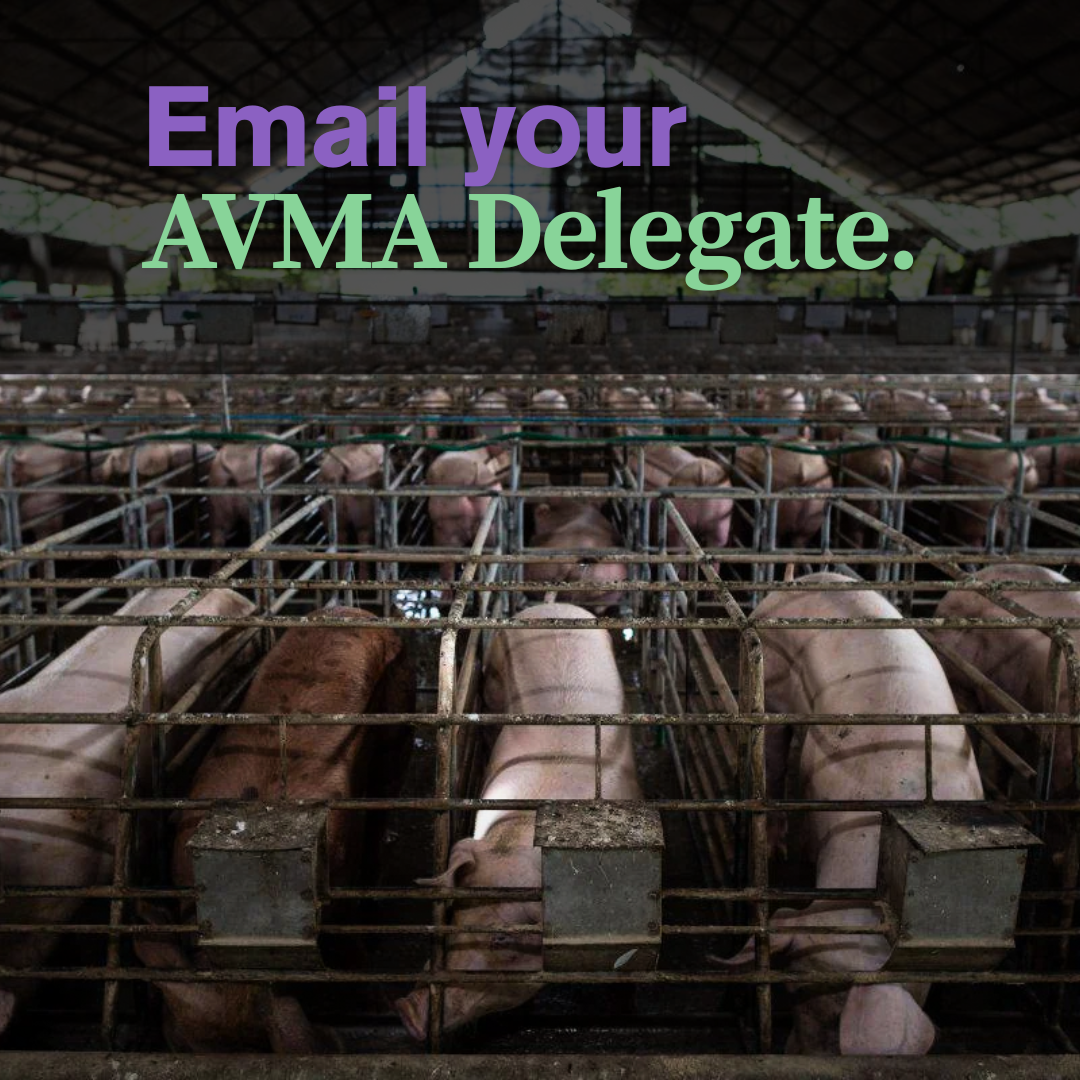AVMA Email Template RE: Sow Housing
Subject: Concerns Regarding AVMA Policy on Sow Housing and Public Health Implications
Dear [Delegate’s Name],
I appreciate that the AVMA has updated its recommendations on sow housing. However, I am concerned that the current language is too vague and may lead to the misinterpretation that confining pregnant sows in gestation crates satisfies AVMA policy. This ambiguity leaves room for producers to exploit the policy in ways that undermine animal welfare, public health, and our profession’s reputation as caring advocates for animals.
We’ve seen this before. In the context of depopulation, for example, producers invoked AVMA-endorsed methods such as ventilation shutdown plus (VSD+) to justify the use of cruel practices under the guise of “constrained circumstances.” Rather than investing in less cruel alternatives, many companies leaned on AVMA approval to maintain consumer trust and their social license to operate.
It is especially troubling that the AVMA has also lent its support to legislation that would override voter-approved animal welfare protections. Most recently, the AVMA backed Section 12007 of the Farm, Food, and National Security Act of 2024, which seeks to nullify California’s voter-approved Proposition 12, which would ban the sale of certain meat from pigs whose mothers were confined in pens deemed too small. In a letter to lawmakers, the AVMA wrote:
“Informed by its members’ unique scientific training and knowledge, the AVMA offers strong support for section 12007 of the Farm, Food and National Security Act of 2024, which protects veterinarians’ freedom and flexibility to provide the best care for farm animals”
This position undermines the will of voters, denies consumers the right to choose which products can be sold in their state, and enables industry practices that pose serious public health risks. The letter goes on to say:
“In addition, allowing one state to dictate animal raising requirements to other states in order to sell their products in its state not only interferes with interstate commerce, but carves a path for future governance of all states by individual states whose laws they may not agree with.”
However, the U.S. Supreme Court upheld California’s Proposition 12 in the case National Pork Producers Council v. Ross, decided on May 11, 2023, the Court upheld the constitutionality of California’s Proposition 12, ruling in a 5–4 decision that it does not violate the Dormant Commerce Clause. Writing for the Court, Justice Gorsuch noted that Proposition 12 applies equally to in-state and out-of-state producers and does not discriminate against interstate commerce. The Court declined to adopt the argument that the law’s “extraterritorial effects” made it unconstitutional, affirming that states may impose standards on goods sold within their borders—even when those standards reflect moral or health concerns. As such, the AVMA’s claim that Proposition 12 “interferes with interstate commerce” in a constitutionally impermissible way is no longer legally valid. The AVMA should update its policy positions and advocacy materials to reflect that Proposition 12 has been upheld as a legitimate exercise of state regulatory power.
The science is clear: Stress in intensively confined sows increases the growth and virulence of the pathogens pigs commonly carry and stimulates the growth of pathogens, including Campylobacter, Salmonella, Yersinia, Listeria, and Staphylococcus aureus.
According to the FDA, 27.1% of all medically important antibiotics sold in the U.S. in 2018 were used in pork production.
A 2020 study found that the piglets of group-housed sows “had better resistance and resilience, which showed that these piglets were healthier” and were exposed to fewer pathogens than those of crated sows.
Sows in gestation crates are more likely to shed Campylobacter, and 83% of Campylobacter found on retail pork chops were resistant to at least one medically important antibiotic.
37,000 human Campylobacter infections annually are attributable to contaminated pork, and up to 60% of piglets are infected with Campylobacter at birth, often remaining carriers until slaughter.
The U.S. sees 2.9 million illnesses each year from contaminated meat and poultry.
According to food safety economist Robert L. Scharff, “In 2020, the annual number of foodborne illnesses in the U.S. attributable to pork consumption had increased to 787,000, with the largest share attributable to pork—even more than beef or chicken.”
Given this overwhelming evidence, I urge the AVMA to adopt stronger, more specific language that discourages the use of gestation crates and acknowledges their role in compromising animal welfare and endangering public health. Furthermore, I hope our profession will reconsider its support for legislation that undermines science-based public policy and consumer choice.
Thank you for your time and continued service on behalf of AVMA members.
Sincerely,

